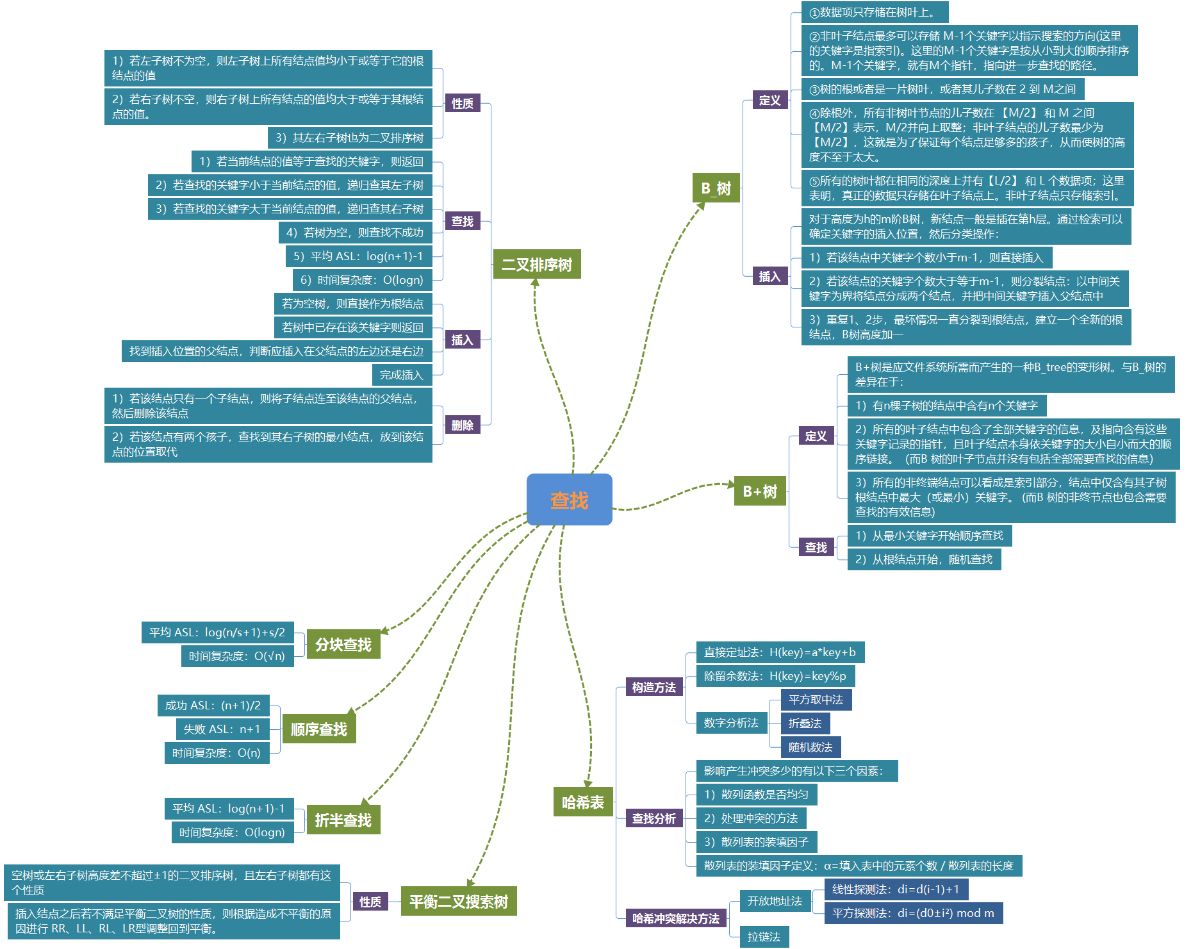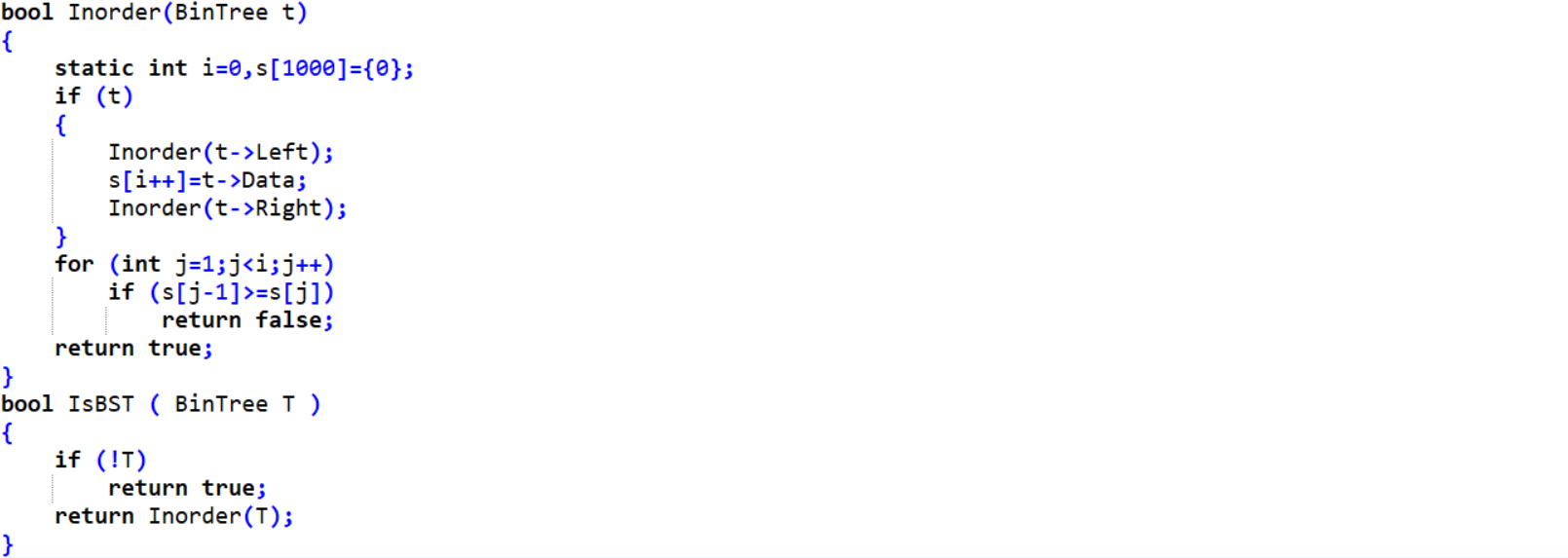博客作业05--查找
一、学习总结
1.1 查找的思维导图

1.2 查找的学习体会
- 对应不同的使用环境,需要使用不同的查找方法以提高查找的效率或者是适合该环境。例如,适用于文件系统的B+树,插入和查找时间消耗都比较少的哈希表。
- C++的map、set等头文件十分节省我们的时间,提供了相当好用的工具。例如,如果是用map方法完成本次作业的7-1、7-2,只需要简单的使用、书写就可以完成,比起自己从头开始写结构体等更加方便。但是在使用它们的同时也要懂得用多种方法完成。
- 学到了map和set的知识。map是一对一的映射,set是一些键的集合,不存在映射。由它们的构造决定它们的元素关键字是不重合的。
二、PTA实验作业
2.1.1 题目1:6-2 是否二叉搜索树
2.1.2 设计思路
bool Inorder(BinTree t) {
//中序遍历二叉树,遍历所得顺序存入数组中
for j=1 to 数组存放元素格-1
if 数组第 j-1 个元素大于数组第 j 个元素
返回 false;
返回true;
}
bool IsBST (BinTree T){
若 T 不存在
返回 true;
返回调用函数 Inorder (T) 的值;
}
2.1.3 代码截图

2.1.4 PTA列表提交说明

- 重点是左右子树都要为二叉搜索树,即它们的先序遍历结果是递增序列,因此可以用数组存放它们的值,只要遍历数组时发现有前面元素大于后面元素,就可以说明该树不是二叉搜索树
2.2.1 题目2:6-3 二叉搜索树中的最近公共祖先
2.2.2 设计思路
int find ( Tree p , int x ) //在树中查找p,找到返回 1 ,找不到返回 0
int LCA ( Tree T , int u , int v ) { //主要函数
使指针 p 指向 T
若 u 或 v 不在树里或该树只有一个结点返回 ERROR
while p 不为空
if p 的关键字大于 u 和 v :p 向左子树移动
else if p 的关键字小于 u 和 v :p 向右子树移动
else 说明 p 关键字在 u 和 v 之间,是它们的 LCA ,就返回这个值
end while
返回 ERROR
2.2.3 代码截图


2.2.4 PTA列表提交说明


- 这几个测试点应该是一个错误:我把没找到的返回值定为了 -1 ,没注意到题目会把 ERROR 的值改变。
- 之前是思路上的错误:想着 u 的值是否大于 v ,以及能否使用前中后遍历等方式解决。
2.3.1 题目3:7-1 QQ帐户的申请与登陆
2.3.2 设计思路
//定义以关键字为string类型,对应类型为string类型的map:user
while n大于0时:
输入 c 和 num 和 str
若 c 的值是 L :如果 user[num] 为空,则输出 “ERROR: Not Exist” ;
不然:如果 user[num] 对应的内容与 str 相同,输出 "Login: OK" ,否则输出 "ERROR: Wrong PW"
若c值为 N :如果 user[num] 不为空,则输出 "ERROR: Exist" ;
不然:将 user[num] 对应的内容赋值为 str ( string 类型支持),输出 "New: OK"
2.3.3 代码截图

2.3.4 PTA列表提交说明
- 使用 map 时,需要知道自己到底想要的是什么样的效果,我犯的错误是使用自己并不熟悉的新知识完成,查错起来十分麻烦。
三、截图本周题目集的PTA最后排名
3.1 PTA排名

3.2 我的总分:167
四、阅读代码
原文地址:https://www.kancloud.cn/digest/stl-sources/177286
代码
#ifndef __SGI_STL_INTERNAL_HASH_MAP_H
#define __SGI_STL_INTERNAL_HASH_MAP_H
#include <concept_checks.h>
__STL_BEGIN_NAMESPACE
#if defined(__sgi) && !defined(__GNUC__) && (_MIPS_SIM != _MIPS_SIM_ABI32)
#pragma set woff 1174
#pragma set woff 1375
#endif
//hash_map的底层是基于hash table的,hash table没有提供排序,所以hash_map容器里面的内容是没排序的
// Forward declaration of equality operator; needed for friend declaration.
template <class _Key, class _Tp,
class _HashFcn __STL_DEPENDENT_DEFAULT_TMPL(hash<_Key>),
class _EqualKey __STL_DEPENDENT_DEFAULT_TMPL(equal_to<_Key>),
class _Alloc = __STL_DEFAULT_ALLOCATOR(_Tp) >
class hash_map;
template <class _Key, class _Tp, class _HashFn, class _EqKey, class _Alloc>
inline bool operator==(const hash_map<_Key, _Tp, _HashFn, _EqKey, _Alloc>&,
const hash_map<_Key, _Tp, _HashFn, _EqKey, _Alloc>&);
template <class _Key, class _Tp, class _HashFcn, class _EqualKey,
class _Alloc>
class hash_map
{
// requirements:
__STL_CLASS_REQUIRES(_Key, _Assignable);
__STL_CLASS_REQUIRES(_Tp, _Assignable);
__STL_CLASS_UNARY_FUNCTION_CHECK(_HashFcn, size_t, _Key);
__STL_CLASS_BINARY_FUNCTION_CHECK(_EqualKey, bool, _Key, _Key);
private:
//_Select1st<>取出键值key,_Select1st<>定义在<stl_function.h>
/*
template <class _Arg, class _Result>
struct unary_function {
typedef _Arg argument_type;
typedef _Result result_type;
};
template <class _Pair>
struct _Select1st : public unary_function<_Pair, typename _Pair::first_type> {
const typename _Pair::first_type& operator()(const _Pair& __x) const {
return __x.first;
}
};
*/
typedef hashtable<pair<const _Key,_Tp>,_Key,_HashFcn,
_Select1st<pair<const _Key,_Tp> >,_EqualKey,_Alloc> _Ht;
_Ht _M_ht;//底层机制以hash table完成
public:
//以下的内嵌类型均来是hash table
typedef typename _Ht::key_type key_type;
typedef _Tp data_type;
typedef _Tp mapped_type;
typedef typename _Ht::value_type value_type;
typedef typename _Ht::hasher hasher;
typedef typename _Ht::key_equal key_equal;
typedef typename _Ht::size_type size_type;
typedef typename _Ht::difference_type difference_type;
typedef typename _Ht::pointer pointer;
typedef typename _Ht::const_pointer const_pointer;
typedef typename _Ht::reference reference;
typedef typename _Ht::const_reference const_reference;
typedef typename _Ht::iterator iterator;
typedef typename _Ht::const_iterator const_iterator;
typedef typename _Ht::allocator_type allocator_type;
//返回hash相关函数
hasher hash_funct() const { return _M_ht.hash_funct(); }
key_equal key_eq() const { return _M_ht.key_eq(); }
allocator_type get_allocator() const { return _M_ht.get_allocator(); }
public:
//构造函数
//缺省情况使用大小为100,但是实际分配的空间大小为不小于100的最小素数
//只是空的hash_map,不存储元素节点
hash_map() : _M_ht(100, hasher(), key_equal(), allocator_type()) {}
//指定大小n的hash_map表
explicit hash_map(size_type __n)
: _M_ht(__n, hasher(), key_equal(), allocator_type()) {}
//指定大小为n,且指定hash函数的hash_map
hash_map(size_type __n, const hasher& __hf)
: _M_ht(__n, __hf, key_equal(), allocator_type()) {}
//指定大小为n,且指定hash函数和键值比较函数的hash_map
hash_map(size_type __n, const hasher& __hf, const key_equal& __eql,
const allocator_type& __a = allocator_type())
: _M_ht(__n, __hf, __eql, __a) {}
#ifdef __STL_MEMBER_TEMPLATES
//以下hash_map的插入操作使用hash table的insert_unique插入
//不允许有相同的键值插入
//用某个范围的元素初始化hash_map对象
//相当于把某个范围[f,l)插入到空的hash_map
template <class _InputIterator>
hash_map(_InputIterator __f, _InputIterator __l)
: _M_ht(100, hasher(), key_equal(), allocator_type())
{ _M_ht.insert_unique(__f, __l); }//调用hash table的插入函数
template <class _InputIterator>
hash_map(_InputIterator __f, _InputIterator __l, size_type __n)
: _M_ht(__n, hasher(), key_equal(), allocator_type())
{ _M_ht.insert_unique(__f, __l); }
template <class _InputIterator>
hash_map(_InputIterator __f, _InputIterator __l, size_type __n,
const hasher& __hf)
: _M_ht(__n, __hf, key_equal(), allocator_type())
{ _M_ht.insert_unique(__f, __l); }
template <class _InputIterator>
hash_map(_InputIterator __f, _InputIterator __l, size_type __n,
const hasher& __hf, const key_equal& __eql,
const allocator_type& __a = allocator_type())
: _M_ht(__n, __hf, __eql, __a)
{ _M_ht.insert_unique(__f, __l); }
#else
hash_map(const value_type* __f, const value_type* __l)
: _M_ht(100, hasher(), key_equal(), allocator_type())
{ _M_ht.insert_unique(__f, __l); }
hash_map(const value_type* __f, const value_type* __l, size_type __n)
: _M_ht(__n, hasher(), key_equal(), allocator_type())
{ _M_ht.insert_unique(__f, __l); }
hash_map(const value_type* __f, const value_type* __l, size_type __n,
const hasher& __hf)
: _M_ht(__n, __hf, key_equal(), allocator_type())
{ _M_ht.insert_unique(__f, __l); }
hash_map(const value_type* __f, const value_type* __l, size_type __n,
const hasher& __hf, const key_equal& __eql,
const allocator_type& __a = allocator_type())
: _M_ht(__n, __hf, __eql, __a)
{ _M_ht.insert_unique(__f, __l); }
hash_map(const_iterator __f, const_iterator __l)
: _M_ht(100, hasher(), key_equal(), allocator_type())
{ _M_ht.insert_unique(__f, __l); }
hash_map(const_iterator __f, const_iterator __l, size_type __n)
: _M_ht(__n, hasher(), key_equal(), allocator_type())
{ _M_ht.insert_unique(__f, __l); }
hash_map(const_iterator __f, const_iterator __l, size_type __n,
const hasher& __hf)
: _M_ht(__n, __hf, key_equal(), allocator_type())
{ _M_ht.insert_unique(__f, __l); }
hash_map(const_iterator __f, const_iterator __l, size_type __n,
const hasher& __hf, const key_equal& __eql,
const allocator_type& __a = allocator_type())
: _M_ht(__n, __hf, __eql, __a)
{ _M_ht.insert_unique(__f, __l); }
#endif /*__STL_MEMBER_TEMPLATES */
public:
//以下的函数操作只是调用hash table的成员函数
//返回 hash_map 容器中元素的个数.
size_type size() const { return _M_ht.size(); }
//返回hash_map容器最大存储元素的个数.
size_type max_size() const { return _M_ht.max_size(); }
//Returns a bool value indicating whether the hash_map container is empty,
//i.e. whether its size is 0.
bool empty() const { return _M_ht.empty(); }
//交换两个存储相同元素类型的hash_map容器内容,但是hash_map容器大小可以不同
void swap(hash_map& __hs) { _M_ht.swap(__hs._M_ht); }
#ifdef __STL_MEMBER_TEMPLATES
template <class _K1, class _T1, class _HF, class _EqK, class _Al>
friend bool operator== (const hash_map<_K1, _T1, _HF, _EqK, _Al>&,
const hash_map<_K1, _T1, _HF, _EqK, _Al>&);
#else /* __STL_MEMBER_TEMPLATES */
friend bool __STD_QUALIFIER
operator== __STL_NULL_TMPL_ARGS (const hash_map&, const hash_map&);
#endif /* __STL_MEMBER_TEMPLATES */
iterator begin() { return _M_ht.begin(); }
iterator end() { return _M_ht.end(); }
const_iterator begin() const { return _M_ht.begin(); }
const_iterator end() const { return _M_ht.end(); }
public:
//插入元素
/*
(1)
pair<iterator,bool> insert ( const value_type& val );
(2)
template <class InputIterator>
void insert ( InputIterator first, InputIterator last );
*/
//不允许有重复的键值
//返回pair第二个参数second若为true则插入成功
pair<iterator,bool> insert(const value_type& __obj)
{ return _M_ht.insert_unique(__obj); }//调用hash table的insert_unique()函数
#ifdef __STL_MEMBER_TEMPLATES
template <class _InputIterator>
void insert(_InputIterator __f, _InputIterator __l)
{ _M_ht.insert_unique(__f,__l); }
#else
void insert(const value_type* __f, const value_type* __l) {
_M_ht.insert_unique(__f,__l);
}
void insert(const_iterator __f, const_iterator __l)
{ _M_ht.insert_unique(__f, __l); }
#endif /*__STL_MEMBER_TEMPLATES */
pair<iterator,bool> insert_noresize(const value_type& __obj)
{ return _M_ht.insert_unique_noresize(__obj); }
//Searches the container for an element with k as key and returns an iterator to it if found,
//otherwise it returns an iterator to hash_map::end
iterator find(const key_type& __key) { return _M_ht.find(__key); }
const_iterator find(const key_type& __key) const
{ return _M_ht.find(__key); }
//If k matches the key of an element in the container, the function returns a reference to its mapped value.
_Tp& operator[](const key_type& __key) {
return _M_ht.find_or_insert(value_type(__key, _Tp())).second;
}
//Searches the container for elements whose key is k and returns the number of elements found.
//由于不存在重复的键值,所以返回的个数最多为1个
size_type count(const key_type& __key) const { return _M_ht.count(__key); }
//Returns the bounds of a range that includes all the elements in the container with a key that compares equal to k
//由于不存在重复的键值,所以返回的元素最多为1个
pair<iterator, iterator> equal_range(const key_type& __key)
{ return _M_ht.equal_range(__key); }
pair<const_iterator, const_iterator>
equal_range(const key_type& __key) const
{ return _M_ht.equal_range(__key); }
//删除元素
/*
by position (1)
iterator erase ( const_iterator position );
by key (2)
size_type erase ( const key_type& k );
range (3)
iterator erase ( const_iterator first, const_iterator last );
*/
//擦除指定键值的元素,并返回擦除的个数
//因为键值唯一,则该键值的元素最多为1个
size_type erase(const key_type& __key) {return _M_ht.erase(__key); }
//擦除指定位置的元素
void erase(iterator __it) { _M_ht.erase(__it); }
//擦除指定范围的元素
void erase(iterator __f, iterator __l) { _M_ht.erase(__f, __l); }
//清空hash_map容器
void clear() { _M_ht.clear(); }
//调整hash_set容器的容量
void resize(size_type __hint) { _M_ht.resize(__hint); }
//Returns the number of buckets in the hash_map container.
size_type bucket_count() const { return _M_ht.bucket_count(); }
//Returns the maximum number of buckets that the hash_map container can have.
size_type max_bucket_count() const { return _M_ht.max_bucket_count(); }
//Returns the number of elements in bucket n
size_type elems_in_bucket(size_type __n) const
{ return _M_ht.elems_in_bucket(__n); }//返回指定桶子键值key中list链表的元素个数
};
template <class _Key, class _Tp, class _HashFcn, class _EqlKey, class _Alloc>
inline bool
operator==(const hash_map<_Key,_Tp,_HashFcn,_EqlKey,_Alloc>& __hm1,
const hash_map<_Key,_Tp,_HashFcn,_EqlKey,_Alloc>& __hm2)
{
return __hm1._M_ht == __hm2._M_ht;
}
#ifdef __STL_FUNCTION_TMPL_PARTIAL_ORDER
template <class _Key, class _Tp, class _HashFcn, class _EqlKey, class _Alloc>
inline bool
operator!=(const hash_map<_Key,_Tp,_HashFcn,_EqlKey,_Alloc>& __hm1,
const hash_map<_Key,_Tp,_HashFcn,_EqlKey,_Alloc>& __hm2) {
return !(__hm1 == __hm2);
}
//交换两个hash_map容器的内容
template <class _Key, class _Tp, class _HashFcn, class _EqlKey, class _Alloc>
inline void
swap(hash_map<_Key,_Tp,_HashFcn,_EqlKey,_Alloc>& __hm1,
hash_map<_Key,_Tp,_HashFcn,_EqlKey,_Alloc>& __hm2)
{
__hm1.swap(__hm2);
}
#endif /* __STL_FUNCTION_TMPL_PARTIAL_ORDER */
五、代码Git提交记录截图




